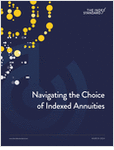Dan Ariely, author of "Predictably Irrational," and a professor at Duke University, presented the keynote address at the formal opening of the FPA's annual conference in Denver on Saturday afternoon. He discussed the challenges and underlying benefits of irrationality in our daily lives, and applied the lessons of behavioral finance to advisors and their clients.
Punctuated with amusing examples and audience participation, Ariely illustrated the dangers of myopic thinking influenced by our, often incorrect biases.
[See a previous article on Ariely's research in Investment Advisor.]
Beginning on a serious note, Ariely revealed that he was burned seriously some time ago and spent nearly three years recovering in the hospital. It was there he began his study of human behavior. Noting his nurses would quickly, but painfully, remove his bandages, he set about researching the question of how to best accentuate the positive and minimizing the negative over time. He concluded that his nurses, while believing to be acting in his best interest, we’re wrong to quickly remove the bandages.
“In the tradeoff between displeasure and duration, duration does not matter,” he noted. “A high amount of pain that decreases over time in worse than a low amount of pain that increases over time. Why were the nurses so consistently wrong in their thinking? It doesn’t matter what we know. Outside stimuli will influence us in a way that will cause us to do what is wrong.”
When researching a particular topic, the manner in which the question is asked, the number of choices in the answer and the ease with which someone can engage all affect the outcome. For example, Ariely noted that organ donation varies widely in countries that have common characteristics. Scandinavian countries, in particular, have some population whose organ donation registration is close to 100%, while others barely break 20%. The discrepancy is attributed to something as simple as whether or not citizens can opt-in or opt-out of the program.








 October 10, 2010 at 09:12 AM
October 10, 2010 at 09:12 AM










